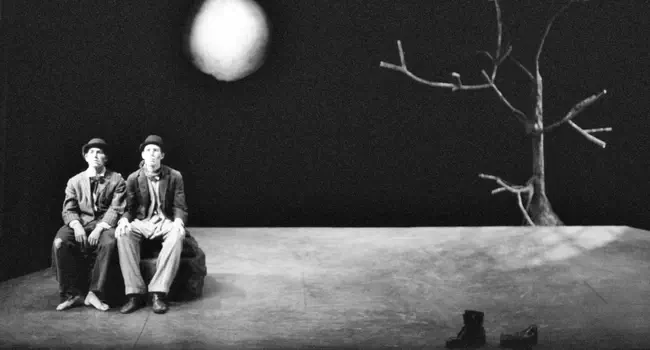A form of absurd drama emphasizes on the absurdity of human existence. Absurd drama doesn’t maintain any plot, characterization, logical sequence and culmination. It picks the very meaning of existence. Though absurd drama may be seen as nonsense, it has something to say the readers. Absurd drama contains fewest possible characters. Dialogues are very short in this types of drama. In “Le Mythe de Sisyphe” (The Myth of Sisypus) Albert Camus first introduced the term “the absurd” in 1942. The very word absurd means nonsensical, opposed to reason, something silly, foolish or ridiculous etc.
The term, absurd, is specially associated with the names Samuel Backett, Eugene Ionesco, Jean Genet and Arthur Adamou. But Backett is the remarkable one in this field. Waiting for Godot is his masterpiece. The drama is a direct phenomenon of World War 2. The post-World war situation was too much critical. No one could find work to do. All was demolished. Everybody was frustrated. The glorification of life had been broken down. Humanity lost its own way.
“Nothingness” is prominent part of this drama. Estragon and Vladimir are talking each other but their conversation is not logical. They perform meaningless actions. Sometimes they try to die and it was a matter of enjoyment for them. After spending time they both intended to leave the place but no one left. Here waiting for Godot is only active in two words “Lets go”. Actually Waiting for Godot doesn’t tell a story. It explores a static situation of the than society. Backett shows the society through one line “Everything is dead but the tree”. The play based on the theme “Nothing to be done”.
Waiting for Godot is a play of waiting, unlimited waiting. Estragon and Vladimir wait for Godot who may be the God, life, death, silence, love, hope etc. Estragon is from France, Vladimir is from Russia, Pozzo is Italian, Lucky is English. All are waiting for Godot. This situation defines that the entire world is suffering a lot. The very picture of the drama is really a parameter of absurdity in the general progression of the drama. The play depicts a basic nullity of human life.
Absurdity is the central theme of the play Waiting for Godot. The characters of the play don’t have concrete thinking or idea. All day they wait for the Godot. Sometimes they do some strange activity. They try to commit suicide or tell one another to leave the place but don’t move a single step. Many times they utter “Nothing to be done”. All the characters wait for the uncertain Godot which is the permanent example of absurdity.
Lack of characterization is the level of absurd drama. In Waiting for Godot all the characters- Vladimir, Estragon, Lucky, Pozzo and non-existent Godot don’t grow during the course of time. No character is proper in this drama. They all do meaningless work from first to last picture of the drama. Their conversation reflects the idea of nothingness as they have nothing to converse with one another. No change is occurred from first to last of the drama. The characters didn’t able to change anything through the entire drama.
Waiting for Godot depicts time is a circular reality. The time is recorded in this drama is really present which doesn’t have past or future. At the end of the play we are at the same position as we are at the beginning. Through beginning to end nothingness is transected in the drama. Estragon, Vladimir, Lucky, Pozzo didn’t get their expected Godot through the course of time and time also didn’t able to change their mind. Time is stopped here.
To sum up, Waiting for Godot presents a critique of modern society by showing the social collapse of communication. Here no action is meaningful. Thus, Waiting for Godot is an absurd drama indeed.

